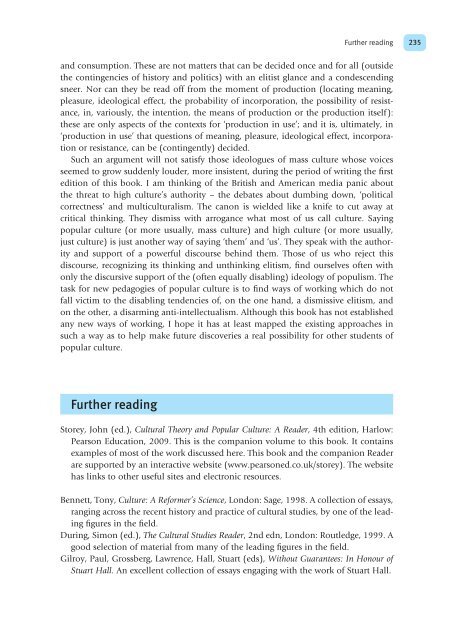Cultural Theory and Popular Culture
Cultural Theory and Popular Culture
Cultural Theory and Popular Culture
Create successful ePaper yourself
Turn your PDF publications into a flip-book with our unique Google optimized e-Paper software.
<strong>and</strong> consumption. These are not matters that can be decided once <strong>and</strong> for all (outside<br />
the contingencies of history <strong>and</strong> politics) with an elitist glance <strong>and</strong> a condescending<br />
sneer. Nor can they be read off from the moment of production (locating meaning,<br />
pleasure, ideological effect, the probability of incorporation, the possibility of resistance,<br />
in, variously, the intention, the means of production or the production itself):<br />
these are only aspects of the contexts for ‘production in use’; <strong>and</strong> it is, ultimately, in<br />
‘production in use’ that questions of meaning, pleasure, ideological effect, incorporation<br />
or resistance, can be (contingently) decided.<br />
Such an argument will not satisfy those ideologues of mass culture whose voices<br />
seemed to grow suddenly louder, more insistent, during the period of writing the first<br />
edition of this book. I am thinking of the British <strong>and</strong> American media panic about<br />
the threat to high culture’s authority – the debates about dumbing down, ‘political<br />
correctness’ <strong>and</strong> multiculturalism. The canon is wielded like a knife to cut away at<br />
critical thinking. They dismiss with arrogance what most of us call culture. Saying<br />
popular culture (or more usually, mass culture) <strong>and</strong> high culture (or more usually,<br />
just culture) is just another way of saying ‘them’ <strong>and</strong> ‘us’. They speak with the authority<br />
<strong>and</strong> support of a powerful discourse behind them. Those of us who reject this<br />
discourse, recognizing its thinking <strong>and</strong> unthinking elitism, find ourselves often with<br />
only the discursive support of the (often equally disabling) ideology of populism. The<br />
task for new pedagogies of popular culture is to find ways of working which do not<br />
fall victim to the disabling tendencies of, on the one h<strong>and</strong>, a dismissive elitism, <strong>and</strong><br />
on the other, a disarming anti-intellectualism. Although this book has not established<br />
any new ways of working, I hope it has at least mapped the existing approaches in<br />
such a way as to help make future discoveries a real possibility for other students of<br />
popular culture.<br />
Further reading<br />
Further reading 235<br />
Storey, John (ed.), <strong>Cultural</strong> <strong>Theory</strong> <strong>and</strong> <strong>Popular</strong> <strong>Culture</strong>: A Reader, 4th edition, Harlow:<br />
Pearson Education, 2009. This is the companion volume to this book. It contains<br />
examples of most of the work discussed here. This book <strong>and</strong> the companion Reader<br />
are supported by an interactive website (www.pearsoned.co.uk/storey). The website<br />
has links to other useful sites <strong>and</strong> electronic resources.<br />
Bennett, Tony, <strong>Culture</strong>: A Reformer’s Science, London: Sage, 1998. A collection of essays,<br />
ranging across the recent history <strong>and</strong> practice of cultural studies, by one of the leading<br />
figures in the field.<br />
During, Simon (ed.), The <strong>Cultural</strong> Studies Reader, 2nd edn, London: Routledge, 1999. A<br />
good selection of material from many of the leading figures in the field.<br />
Gilroy, Paul, Grossberg, Lawrence, Hall, Stuart (eds), Without Guarantees: In Honour of<br />
Stuart Hall. An excellent collection of essays engaging with the work of Stuart Hall.
















